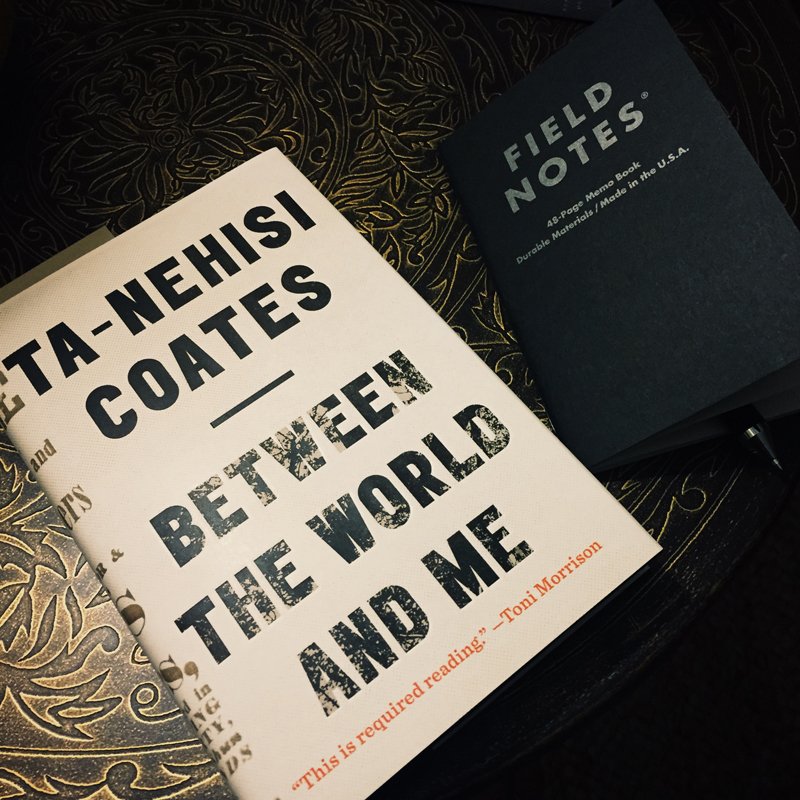Between the World and Me
Between the World and Me is a sad book. A profoundly bleak, sad book.
I sought out Ta-Nehisi Coates’ new bestseller at my local bookstore with a measure of persistence; it was sold out the first couple of times I tried. When I finally got my hands on a copy, I sat down to read it with an expectant and open mind. In light of the heartbreaking – and, yes, body-breaking – racism in the news these past few years, I wanted to learn from Coates. I wanted to walk, if only for 152 pages, in his shoes. I really wanted to hear him out.
And to be honest, having just finished this anguished book-length letter to his teenage son, Samori, I still do. That’s because the book unfortunately ends without any clear way forward.
That’s not to say it lacks important insights. Some of us are inclined to think of racism as a battle of hearts and minds, for example – reducing the problem to wrong ideas and ugly, hateful sentiments that lead to terrible violence of various sorts in varying degrees. But Coates emphasizes that racism is thoroughly, inescapably embodied:
Racism is a visceral experience . . . it dislodges brains, blocks airways, rips muscle, extracts organs, cracks bones, breaks teeth. You must never look away from this. You must always remember that the sociology, the history, the economics, the graphs, the charts, the regressions all land, with great violence, upon the body.
That’s a good reminder for those of us who have the luxury of sitting in our reading chairs, reflecting on racism as an idea – a pernicious, evil one to be sure, but an idea nonetheless. Racism is embodied, always and everywhere, and regardless of who you are it should be uncontroversial to say that black lives matter.
But this emphasis on the material nature of racism took me by surprise, and gave me a lot to think about. It also troubled me. That’s because Coates is a materialist in a way that I am not, in a way that the majority of us are not:
Some time ago I rejected magic in all its forms. The rejection was a gift from your grandparents, who never tried to console me with ideas of an afterlife and were skeptical of preordained American glory. In accepting both the chaos of history and the fact of my total end, I was freed to truly consider how I wished to live – specifically, how do I live free in this black body? It is a profound question because America understands itself as God’s handiwork, but the black body is the clearest evidence that America is the work of men . . . The greatest reward of this constant interrogation, of confrontation with the brutality of my country, is that it has freed me from ghosts and girded me against the sheer terror of disembodiment.
A bit later he continues:
I could not retreat, as did so many, into church and its mysteries. My parents rejected all dogmas. We spurned the holidays marketed by the people who wanted to be white. We would not stand for their anthems. We would not kneel before their God. And so I had no sense that any just God was on my side. “The meek shall inherit the earth” meant nothing to me. The meek were battered in West Baltimore, stomped out at Walbrook Junction, bashed up on Park Heights, and raped in the showers of the city jail. My understanding of the universe was physical, and its moral arc bent toward chaos then concluded in a box.
I don’t think it’s a stretch to suggest a correlation between what Coates describes as his enlightened rejection of “magic” and the overwhelming absence of hope in his writing. That, in my estimation, is precisely what makes this book so bleak, so unbearably sad. And it likely explains something else that’s conspicuously missing from these pages. Or, rather, someone.
While Coates repeatedly cites Malcolm X and others as sources of inspiration, Martin Luther King, Jr. does not appear as one of those pivotal figures. Rather, he gets the silent treatment, and it’s clearly an intentional snub.
Again and again, Coates castigates what he calls “the Dream.” I initially took this to be a fairly straightforward reference to the caricatured aspiration in our country to live in a quiet neighborhood in the suburbs with a white picket fence, 2.5 kids, and a gas-guzzling SUV or two in the garage. But as the book goes on, the meaning subtly morphs and expands. At a certain point it occurred to me that Coates must also be issuing a subtle, perhaps, but nonetheless scathing rebuke of the man who had a dream – a profoundly Christian, hope-filled dream of the day when “little black boys and black girls will be able to join hands with little white boys and white girls as sisters and brothers.”
King’s dream pointed toward reconciliation, redemption, and forgiveness. It pointed toward a better future for everyone. It captured imaginations. It emboldened perseverance. It inspired marches, sit-ins, and continually strengthened those facing all manner of indignities and injustices. It brought about sweeping, hard-fought changes, and will continue to do so as long as there is work to be done.
King’s dream represented the heart and soul of the civil rights movement, driven by the conviction that “the arc of the moral universe is long, but it bends towards justice.” Coates rejects all such dreams. He believes, rather, that the moral arc of the universe bends not toward justice but toward chaos and death.
“The Dream thrives on generalization, on limiting the number of possible questions, on privileging immediate answers,” he writes. “The Dream is the enemy of all art, courageous thinking, and honest writing.”
Coates’ rejection of “magic” and “the Dream” also serves to isolate him from others who have suffered because of racist acts. He recounts the story of the death of Prince Jones, a college acquaintance who was pursued, unjustifiably, across state lines by an undercover police officer posing as a drug dealer. After being followed into the driveway, Jones allegedly tried to back his car over him, at which point the officer fatally shot him. The officer wasn’t held responsible for the murder. Coates writes:
I have always felt great distance from the grieving rituals of my people . . . The need to forgive the officer would not have moved me, because even then, in some inchoate form, I knew that Prince was not killed by a single officer so much as he was murdered by his country and all the fears that have marked it from birth . . . For the crime of destroying the body of Prince Jones, I did not believe in forgiveness. When the assembled mourners bowed their heads in prayer, I was divided from them because I believed that the void would not answer back.
Coates made similar comments in a recent NPR interview following the racially motivated mass shooting at Emanuel Church in Charleston, South Carolina, and the extraordinary declarations of forgiveness from the victims’ surviving family members and fellow churchgoers:
I understand not living with hatred. I understand how that can be corrupting, I got that. I don’t understand how you gun down my wife, my mother, my father, my child, and when I see you three days later I say that I forgive you — I don’t understand that . . . Forgiveness is a big part of — especially post-civil rights movement — is a big part of African-American Christianity and I wasn’t raised within the Christian church, I wasn’t raised within any church. Forgiveness is a huge, huge part of it, coming out of the civil rights movement, [but] I can’t access that at all.
Being able to forgive the killer of a person’s loved ones truly is a gut-wrenching miracle. I don’t know how I’d respond if, God forbid, I found myself in that position. But I do believe miracles are possible, that they are mysterious and unpredictable but that they sometimes do happen. If I didn’t believe that, I doubt I could “access” the possibility of forgiveness either.
Coates concludes the book without any constructive vision that I can detect. Perhaps the best semblance of his vision is found elsewhere, in his long, widely discussed cover story last summer in The Atlantic, “The Case for Reparations.” In this book, however, he leaves his son with a modest admonition to struggle, without much hope for justice or reconciliation or any kind of a better future, not even a thoroughly material, this-worldly one:
I do not believe that we can stop them, Samori, because they must ultimately stop themselves. And still I urge you to struggle. Struggle for the memory of your ancestors. Struggle for wisdom . . . Struggle for your grandmother and grandfather, for your name. But do not struggle for the Dreamers. Hope for them. Pray for them, if you are so moved. But do not pin your struggle on their conversion. The Dreamers will have to learn to struggle themselves, to understand that the field for their Dream, the stage where they have painted themselves white, is the deathbed of us all.
Coates is right to call racism a deathbed. But the problem is that he leaves us there, mired in futility, anguish, and despair. Which is why I’m so grateful for the testimony of African American brothers and sisters who remind us, with an eloquence born of suffering, that there is such thing as resurrection – and that all of us, dead as we are, really can be raised up.

